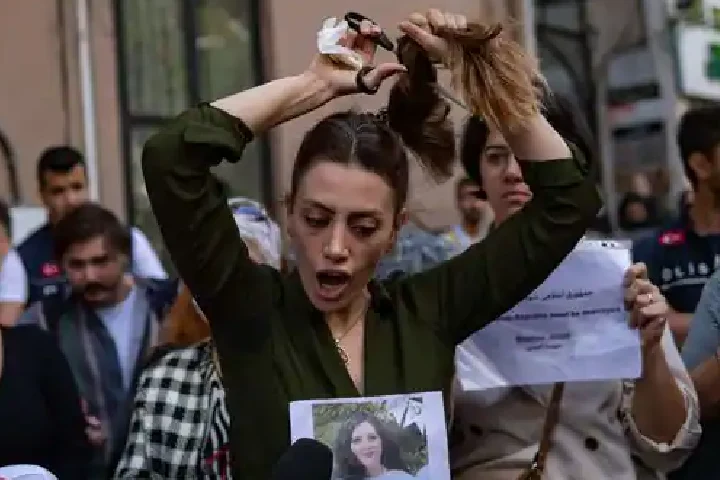

Nasibe Samsaei, an Iranian woman cuts her ponytail off during a protest following the death of an Iranian woman after her arrest by the country's morality police in Tehran.
Two developments bring Iran into focus of West Asia affairs. The anti-hijab protests are back in the country and the Joint Comprehensive Plan of Action (JCPOA) talks with the United States are heading nowhere. Moreover, both the happenings seem to have linkages.
The Tehran Times, English organ of the Iranian regime, carried contents of a video tape purportedly of Brett McGurk, who is White House Coordinator for the Middle East and North Africa and leads the backchannel diplomacy with Iran, saying that the JCPOA is unlikely to be resuscitated.
“We had a disagreement with Israelis on whether getting back in the JCPOA as it is or whether getting a longer stronger deal upfront, we just have a difference of opinion in terms of what is possible um but I’m increasingly, I think it’s increasingly less likely we’re gonna get back into JCPOA anyway,” the American official is heard saying in the audiotape, Tehran Times reported.
McGurk then reveals the components of the US’s Plan B toward Iran, which includes sanctions, diplomatic isolation, military force, and sabotage.
“So, in any event, we are gonna be in the sort of plan B (world?) which means options of the toolkit as what it is, it is diplomatic isolation, its sanctions, it’s a military force, its sabotage,” McGurk averred, as per report.
Till the filing of this report, there was no reaction from the US government and neither the media had carried any item related to it.
Ghost of Amini
Mahsa Amini, a 22-year-old minority Kurdish woman, allegedly died of wounds suffered at the hands of moral cops after she was arrested for not wearing hijab in public in September 2022. It was followed by protests rarely seen in Iran after the i the Islamist government assumed power following the 1979 Revolution.
The Iranian regime, like in all previous cases of unrest, cracked down heavily on the protesters, leaving hundreds of protesters and security personnel dead and thousands sent to jail. The protests returned and people marked Amini’s death anniversary on Sunday.
On Saturday, Mahsa’s father, Amjad Amini, was arrested briefly and warned against marking the anniversary of his daughter’s death, the Kurdistan Human Rights Network said, and the family was not able to hold a planned vigil at her grave.
Many journalists, lawyers, activists, students, academics, artists, public figures and members of ethnic minorities accused of links with the protest wave, as well as relatives of protesters killed in the unrest, have been arrested, summoned, threatened or fired from jobs in the past few weeks, according to Iranian and Western human rights groups.
Iran blames the unrest on its Western foes and rejects criticism of its legal system, saying it is based on a lack of understanding by rights groups of its Islamic laws.
More than 20 Iranian individuals and entities connected to the harsh repression on protesters were sanctioned by the Joe Biden administration, CNN reported. Besides news outlets like Fars and Tasnim news agencies and official news channel Press TV were also put on curbs.
The curbs and protests, according to Iranian media, is the US Plan B against the Persian nation which is rising despite curbs and breaking off diplomatic isolation. “Now, Iran is a member of Shanghai Cooperation Organisation (SCO) and BRICS. Its oil sale is at its highest ever level. Its progress in the science and defence sector is announced almost every week, with foreign clients vying for its products. The US hardliners don’t deem to fathom it and are seeking an old hackneyed mischievous route of supporting faux protesters for toppling the regime. They have failed, and will bite the dust again,” said a pro-government Persian organ in its editorial.
Observers like Professor Manjari Singh of Amity University, Noida, said that both the Iranian hardliners and American officials play foul. “Iranians veil their hardline blaming the West, which is to blame to certain extent though. On the other hand, the US-led western nations over-exaggerate the problems like hijab and other curbs that exist in Iran,” she told India Narrative.
Free Prisoners Deal
In the midst of the hostility, Iran and US successfully reached a prisoner swap deal. Officially announced on August 10, the deal will see the release of five Americans from Iran’s prisons and the same number of Iranians from US jails. All the prisoners were to be freed late on Monday.
In another “relief” for Iran, Iran’s frozen funds in South Korea, worth nearly $6 billion, will be fully accessible to the Iranian government as of Monday, says Foreign Ministry spokesman Nasser Kan’ani on Monday.
Also Read: Why Iran is feeling ‘victorious’ on its entry in the BRICS
Russian Foreign Minister Sergey Lavrov while speaking at the conference on "Russia and India: Towards…
In a significant development in Jammu and Kashmir, two more groups affiliated with Hurriyat Conference--…
Around 35 French higher education institutions, coordinated by Campus France, are participating in the 2025…
External Affairs Minister S Jaishankar reaffirmed the enduring strength of India-Russia relations, emphasising that "India…
Russian President Vladimir Putin is set to visit India, as confirmed by Russian Minister of…
Philippine authorities revealed the capture of six Chinese nationals and one Filipino, who were suspected…